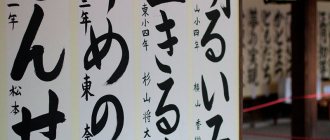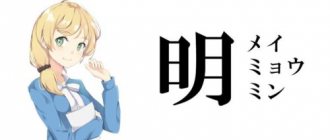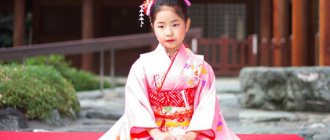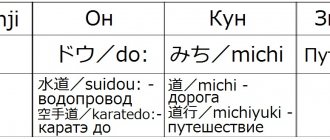Names in modern Japan
Their system today has undergone many changes, and in particular, they are all related to the need to get closer to European culture. One of the main ones is permission to give a name to a girl or boy who is a representative of a different nationality. Even Russian people now have a chance to acquire a local name form (in ancient times this was prohibited).
Of course, Russian names in Japanese do not sound as beautiful as purely national ones, but that’s a separate conversation.
Today, the name forms there consist of a personal and a secondary (generic), moreover, it is the generic that is pronounced first. This tradition is widespread not only in Japan, which we are discussing, but also in many other Southeast regions of Asia. China, Taiwan, Korea, Vietnam - all these and many other cultures use the naming tradition from Japan.
The main charm of the local name scheme is that, unlike other cultures, here a citizen can be assigned his own unique name, made up of existing traditional signs. Well, the most interesting thing is the pronunciation scheme, which is the most difficult element of the national language.
Name Shizuka
The Japanese name meaning "dragon" is loved by both locals and foreigners. What does the name Shizuka represent? Interpretation of this name: quiet. The meanings of the letters in this name are as follows:
- Ш - developed intuition, impulsiveness, ambition, hard work, independence.
- And - intelligence, emotionality, kindness, pessimism, uncertainty, creative inclinations.
- Z - independence, developed intuition, intelligence, hard work, pessimism, secrecy.
- U - kindness, developed intuition, sincerity, creative inclinations, spirituality, optimism.
- K - developed intuition, ambition, impulsiveness, practicality, kindness, sincerity.
- A - selfishness, activity, creative inclinations, impulsiveness, ambition, sincerity.
The number of the name Shizuka is 7. It hides the ability to direct abilities into the world of philosophy or art, into religious activity, and the field of science. But the results of the activities of people with this name largely depend on a deep analysis of victories that have already been achieved and on true planning for their own future. By getting to know other people, they often develop into leaders and teachers of the highest caliber. But if they are engaged in commercial or financial affairs, then here they themselves will need someone’s help.
The planet named after Shizuka is Mercury, the element is cold dry air, the zodiac sign is Virgo and Gemini. The color of this name is changeable, variegated, mixed, day - Wednesday, metals - bismuth, mercury, semiconductors, minerals - agate, emerald, topaz, porphyry, rock crystal, glass, sardonyx, plants - parsley, basil, celery, walnut tree, valerian , animals - weasel, monkey, fox, parrot, stork, thrush, nightingale, ibis, lark, flying fish.
Creation of nicknames in Japan
Any Japanese nickname is created from a common name. To do this, you need to perform only one action: add a special suffix -chan or -kun to the base of the word.
There are several types of foundations. The most popular one looks like the full name: Yasunari, Kimiko (Yasunari-chan, Kimiko-chan). Along with it, a shortened version of the name is used: Ya, Kii (Ya-chan, Kii-chan). Most often it can be heard among friends or family.
Sometimes, to create a diminutive nickname, the name is completely transformed. For example, Megumi's name is changed to Kei-chan. Therefore, the first of the characters that make up the name Megumi is read as Kei.
A new opportunity to create nicknames has joined the newfangled trends. To do this, take the first two syllables of the surname with the given name and connect them together. This method is more common in celebrity nicknames. For example, Kimura Takuya - Kimutaku, Brad Pitt - Burapi and so on. A rarer variation of this variant is the doubling of syllables (Mamiko Noto - Mami Mami).
For the Japanese, a sign of good etiquette is to address an acquaintance by his last name when meeting by chance. If an acquaintance is part of a close social circle, then a diminutive nickname is allowed.
Kanji meanings
The Japanese language has a Kanji culture, which is a set of characters derived from Chinese characters, and the meaning of a name changes depending on the choice of Kanji characters. The more variations of the kanji, the more common the name is in Japan. On the other hand, a name with slight kanji variations is unique and rarely used by the Japanese. For Masaki, the kanji options are listed below.
正香~Masaka~
Meaning:
"正" Positive. "香" Aroma (incense).
真香~Masaka~
History of Japanese names
Before the Maiji Restoration began, ordinary Japanese did not have surnames. They could be worn by high ranks, including aristocrats and warriors. Moreover, unlike army soldiers, the number of which increased, there were fewer and fewer aristocrats.
Japanese names for men and women in their modern form appeared several decades later, but in the pre-restoration period, they were single-word, and they were not worn by ordinary peasants. Peasants and commoners could not acquire surnames.
The number of samurai at that time was increasing, and the rich, the list of which was constantly decreasing, were known throughout the country. There were even famous clans: Kujo, Godjo, Fujiwara, Takashi, Konoe, Sanjo, Hirokata and Ichijo.
In the case of the poor, hard workers and samurai servants, names were assigned according to the principle of numbering - in other words, by name it was possible to determine who was older, younger, held a high rank or low, and also the origin of the person.
Samurai is a completely separate area for study. Initially, at birth, they were awarded the corresponding family, but when the fighter reached maturity, it was possible to change the man’s name - and it is worth noting that this rule was used by the practical majority.
Names, the meaning of which in those days were determined by clan and activity, were something like a “passport”.
After the Maiji Restoration, surnames and corresponding beautiful names were assigned to everyone without exception, but were given based on the type of activity. Particular attention was paid to people whose activities were related to the cultivation and processing of rice.
Examples of the formation of a Japanese interpretation of a Russian name
As we have already found out, it is not the name itself that is translated into Japanese, but its meaning. This transcript may come from Latin, Greek, Hebrew and other languages.
The endings of female names: -i, -na, -mi, -ka, -ko, -ra, -ri, -ki, -e, and also -e. Translation examples are given in the table.
| Female name | Meaning | Pronunciation in Japanese | Hieroglyphs |
| Alexandra | Protector | Mamoka | 守花 |
| Anfisa | Blooming | Kayka | 開花 |
| Alice | Noble | Eizokumi | よい属美 |
| Antonina | Unusual | Sorariko | 空里子 |
| Alla | Other | Sonota | 其の他 |
| Anna | Gracious | Jihiko | 慈悲子 |
Endings of male names: -o, -dai, -go, -sa, -hiko, -ta, -ro, -n, -ru, -bu, -si, -ki, -hey, -ke, -to, - zu, -mu, -ya, -iti, -ti. For examples of male Russian names in Japanese, see the table.
| Male name | Meaning | Pronunciation in Japanese | Hieroglyphs |
| Alexander | Protecting | Mamoru | 守る |
| Artem | Healthy | Anzen | 安全 |
| Alexei | Support | Taske | 助け |
| Arkady | Happy | Shiawakuni | 幸国 |
| Anatoly | Sunrise | Higashi | 東 |
| Anton | Opposing | Rikishi | 東 |
As you can see, this is a literal translation of the words from which Russian name forms are derived into Japanese.
0
Share
Male national name book
Male name forms are a difficult topic to discuss. The peculiarity lies in the use of non-traditional symbols and reference to horoscopes of the Eastern type. But the traditional one is also used no less often, but problems can arise with their pronunciation. In the case of masculine naming, the same sign can be used with different sound options, and the same sound can be displayed in writing with different signs. An example is the “yoshi” component, which is displayed in hundreds of written combinations.
All names for men are divided into groups according to components. There are one-component, two-component, three, and even four - the latter are extremely rare. But regardless of the presence of components, the name given still affects the fate of the named in accordance with the meaning.
In general, the topic of Japanese naming is not easy and is clearly worthy of discussion, but it simply cannot be used in our Slavic world, because it does not suit at least our mentality.









